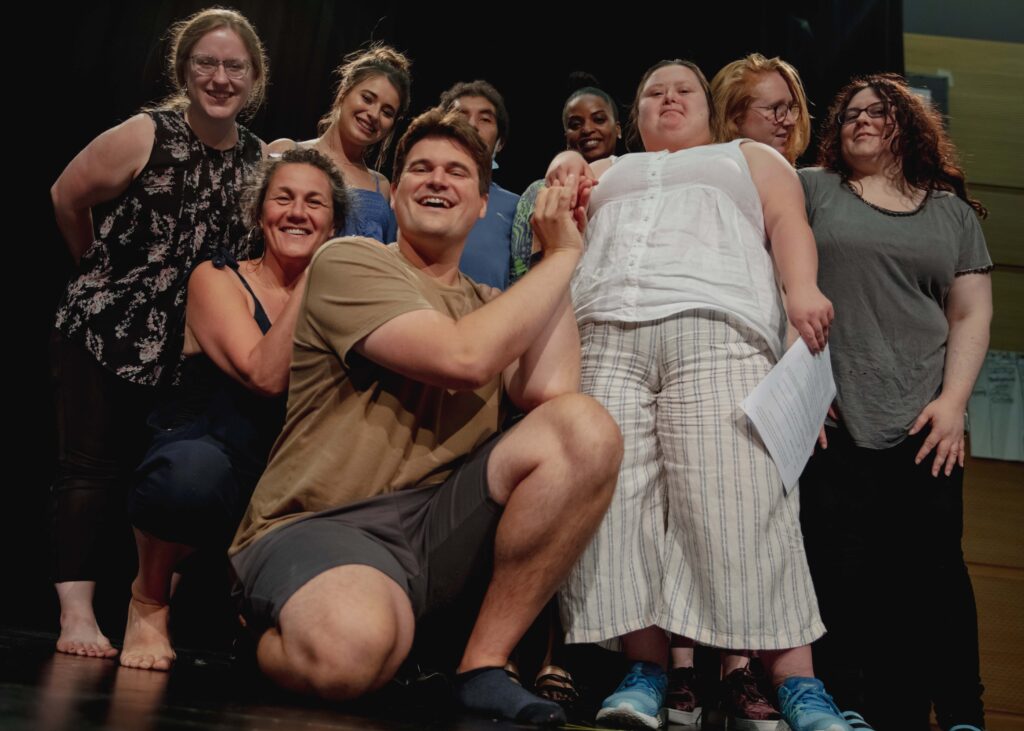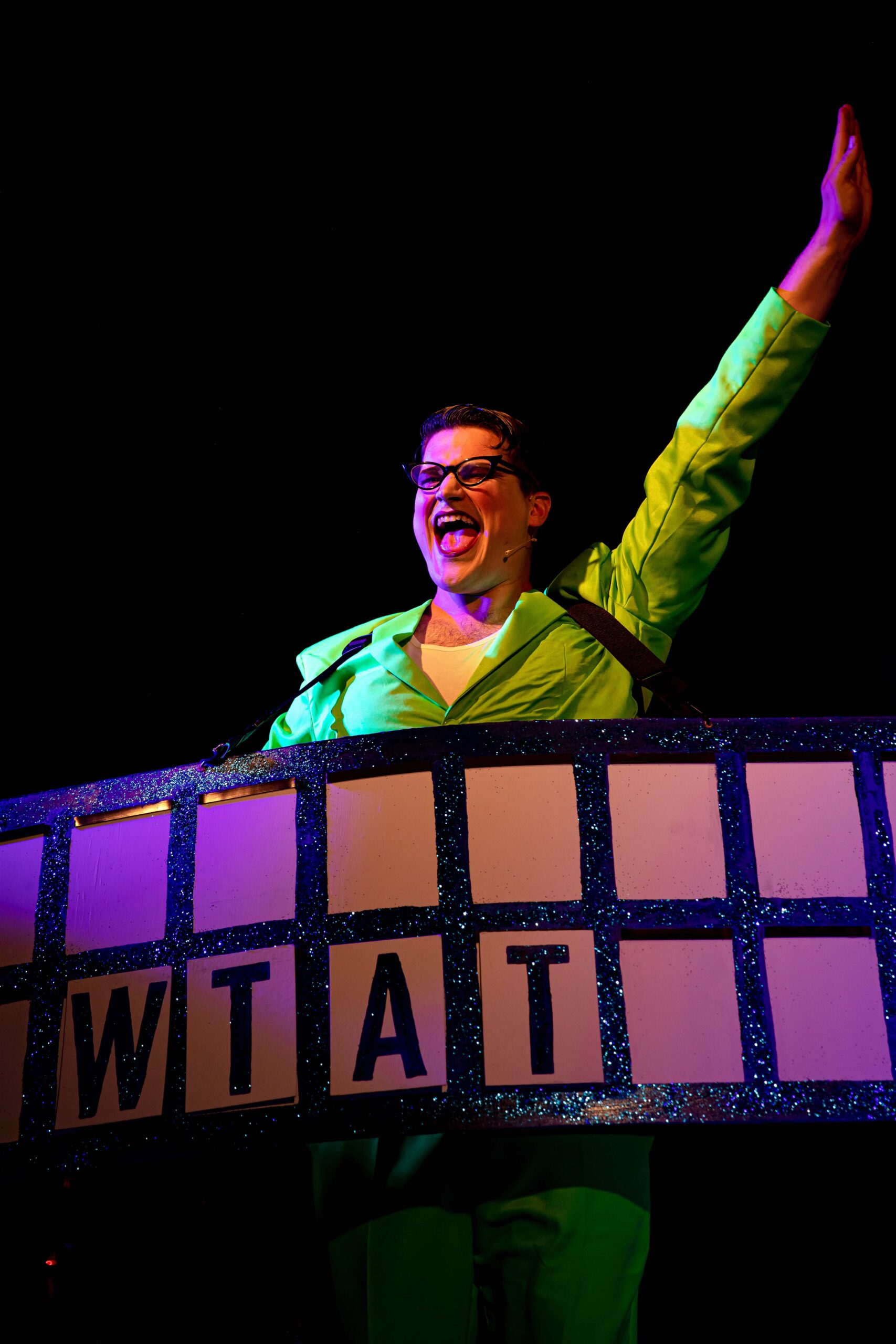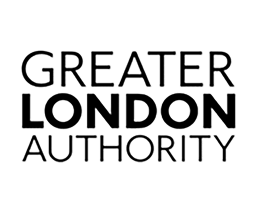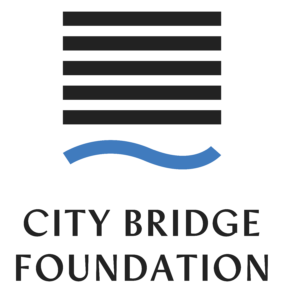At London Arts and Health, we are always looking to share interesting work, practice, ideas and events at the intersection of Creative Health, imagination, wellbeing, empowerment and access. Last week we chatted to Liselle Terret, the co-founder and member of Not Your Circus Dog Collective, a subversive Crip, queer, learning disabled and neuro-divergent performance company. The company was part of the Unlimited Festival last week at Southbank Centre, where they toured their piece ‘Not F**kin Sorry!‘. Unlimited festival features outstanding dance, performance, comedy, music, visual art, and ambitious creative projects by disabled artists and companies. ‘Not F**kin’ Sorry!‘ by Not Your Circus Dog Collective is co-produced by The Hale & Access All Areas.
Read the full interview with Liselle below, and access dates for the performances of the company’s current touring piece ‘Not F…kin’ Sorry’.
Firstly, can you tell us a bit about yourself, Liselle, and your work?
I’m a Neuro-Divergent quirky 53-year-old woman from Glasgow and have lived in England for over 30 years!! BUT I will never lose my Glasgow accent!
I am a single parent with a 12-year-old child and we live in West Sussex near Brighton.
I am also an Associate Professor in Performance at the University of East London.
My work as a performance artist and director foregrounds my identification as Neuro-Divergent, disrupting theatrical norms through a radical Crip, queer, collaborative and feminist approach across my solo performance practice (as Doris La Trine), mentoring, consultancy, teaching, writing and directing. Most recently directing and co-writing Not F**kin Sorry! By Not Your Circus Dog Collective! I am a co-founder and member of Not Your Circus Dog Collective, a subversive crip queer learning disabled and neuro-divergent performance company.
Not F**kin’ Sorry! is a punk Crip queer theatre production drawing on the company’s lived experiences of disability discrimination. I am particularly interested in bringing artists whose work usually falls outside dominant cultural markets to high-profile stages so as to challenge venues and audiences in their understanding of whose stories are told, and on which stages they are permitted.
When I make theatre or when I teach, I endeavour to have an Ethics of Care and Collaboration, transparency and accessibility in the rehearsal room, always.
This is what I strive for because for me – only if this is at the centre – then can we really arrive in the room and reach into our creativity to make new and relevant work, and if I don’t strive for this, then I believe that I am merely repeating and re-enforcing the current discriminatory dynamics that excludes and marginalises. I mainly work with fellow Neuro-Divergent and Learning Disabled artists and creatives re-centring their position within performance for emancipatory self-representation. My driving practice foregrounds learning disability or Crip aesthetics in order to re-affirm the performer as creator and leader in authoring performance. The politics of disability arts lie at the heart of the creative practice – which is about the visibility of agency and understanding the systems that reinforce discrimination. My performance-making is led by Practice as Research which I conduct collaboratively co-constructing radical and political questions about continued exclusion and discriminatory assumptions around binaries of ‘ability/disability’ through our performance practice.
Prior to teaching at UEL I worked at Royal Central School of Speech & Drama where I co- founded with Access All Areas (headed by Nick Lewellyn), the Diploma in Performance Making for adults with Learning Disabilities & Autism that won the Guardian University Award for Student Diversity and Widening Participation in 2015. I have also worked at Coventry University, Brunel University and I continue to work with NYU for their summer abroad Educational Theatre programme. I originally began as a drama teacher, before working at Half Moon Young People’s Theatre and the Unicorn Theatre as well as freelancing.
In 2018, I curated and hosted Wickedly Wild Women Cabaret for WoW Women of the World at Southbank Centre, and for Royal Court Theatre co-curated Take-Up Space Cabaret. I also present and publish as well as document my practice as archival websites.
Liselle’s work is filthy, dirty, shameful, all too personal and at the same time – glorious. Grotesque, powerful, political. A detailed, delicate piece” Simon Casson, (Duckie) on Doris La Trine (2020).
How did the collaboration come about between Not Your Circus Dog Collective and Access all Areas?
Not F…kin’ Sorry was the outcome of a larger project, a one-year part-time course, developed by Nick Llewellyn, Artistic Director of Access All Areas and myself, Liselle and originally funded by the Leverhulme Trust, now by Sky Arts. The course was created “in response to the exclusion of adults with learning disabilities from current professional HE performance-related training courses” and reaffirms the performer as co-creator in authoring devised solo and ensemble performances to develop new aesthetic performance forms and pedagogical practices that are post-dramatic, experimental and often site-specific. It focused on ‘subverting and challenging hegemonic values and assumptions experienced by people with learning disabilities’ (Mackey, Terret, 2014).
I worked with the students on the part-time course directing their end-of-year shows. One year I suggested to the cast that we create a show in the form of a cabaret as so many of the students missed the opportunity of going out and having a dam good time! So we created ‘Not Sorry!” the first iteration of Not F**kin’ Sorry! I invited Simon Casson from Duckie’s to see the end-of-term show, and he commissioned us to develop it into a shorter, tighter piece for the 21st Duckie’s birthday at the Electric Brixton – where we performed to 1,200 people back in 2017! Then Access All Areas further supported the development of Not F**kin’ Sorry through their Arts Council ‘Elevate’ funding that led us to have a one-week R&D at Soho Theatre hosted by Charlotte Bennett (now CO-AD at Paine’s Plough). She just loved it – laughing and crying and this led to our first public run in the upstairs studio at Soho theatre thanks to David Luff in 2019. David then invited us back to the Mainhouse at Soho Theatre!!!! And we have just completed a sold-out run (Aug / Sep 2022) with standing ovations each night at Soho Theatre with 4 and 5 star reviews! You can read our reviews on Broadway World and North Westend.
Tell us about how the show was developed, and what it’s about?
My devising practice is actually informed by the ‘Emancipatory Disability Research’ model that talks about “disabled people’s experiences, narratives, and stories…to highlight the serious politics of the discrimination experienced” (Barnes, 2001 p.13). I was also very influenced by Kafer‘s (2013) Political-Relational Model of disability where we Cripped and Queered these stories that led to extensive whole-company research so that we shifted from pity into pride and ultimately into political activism. Personal experiences and narratives were transformed into rebellious, sexy, confrontational, angry crip queer personas on stage. We used performance as a means of protest for change, and it was this passage to pride that was integral to the devising process.
During the devising process, I noticed that mostly everyone including myself kept apologising for anything and everything, constantly saying, ‘I’m Sorry’ before or after any utterance and any sharing of our work-in-progress.
I’m sorry for doing it wrong; I’m sorry for the way I look; I’m sorry I talk like this; I’m sorry for the way I move; I’m sorry I don’t understand; I’m sorry for my anger.
In the rehearsal room, we made a game of catching one another out before the apology so that we could move it into an ‘I’m Not Sorry’ utterance instead. This had a profound impact upon the whole direction and focus of our performance piece. Through this game, the actors made declarations of what they were not sorry for in order to move on from any performance of victimhood or self-pity.
The very opening (and ending in our revised production) of Not F..kin’ Sorry began with one of our actors Emma speaking a (self-written) declaration. They repeats this at the end, with the other actors taking up positions in a ‘chorus line’ of confrontational rebellion:
So, just what is it that you f**kers want?
You keep calling us broken.
You don’t know the cracks that every single one of you has given us.
The mental scars, the physical scars.
We are sick and tired of being your circus dogs.
This is our time now. We Are Not Going Away.
And No, We Are Not F**kin’ Sorry!

Some of Not Your Circus Dog Collective creative team.
The show oozes joy and shouts proudly and loudly about the cast’s neurodiversity. Can you tell us more about that and the importance that neurodiverse actors have in claiming space on the stage?
All the cast are neurodivergent and/or learning disabled, and most of the production crew are as well all of whom, including the cast, work across the professional theatre industry. The show ranges from comedic entertainment pieces to important themes experienced within our community such as Mate Crime (a lot of learning-disabled people have had ‘tricky and ‘bad’ friends, whereby people take money from you, use you for their benefit, non-consensual and inappropriate touch). You can read more about this in an article here.
Can you tell us something about the show that we might not know?
The production offers an evening of testimony, survival, resilience and celebration. A cabaret with a difference. We want to provoke, maybe shock and wake up audiences so that they realise how we are all implicated in challenging the everyday discrimination experienced by so many learning disabled, Autistic / Neuro-Divergent people.
Here is a quote from one of the reviews – as a taster:
‘This pacy sixty-minute show, this bunch of talented performers are not here to f**k you about. Anyone leaving this show not even slightly more aroused, enlightened or happier than when they arrived should be checked for signs of life….Those seeing it with open hearts and open minds will likely walk away with new knowledge and insights. The cabaret format works superbly, making sure everyone in the room is engaged and not just watching. The delivery is, for the most part, upbeat and punchy and – like being in the midst of an orgy – is an incredibly life-affirming event. Should you go see this? F**k yes.’ Broadway Baby.
And finally Liselle, where and when can we catch it in London?
22 Oct A Bit of a Do Festival
The Front Room: 37 – 39 St George’s Walk, Croydon CR0 1YL
https://www.drunkenchorus.co.uk/
And out of London:
16 Sept Attenborough Arts Centre, Leicester
University of Leicester, Lancaster Rd, Leicester LE1 7HA
www.attenborougharts.com | 0116 252 2455
29 – 30 Sept Contact Theatre, Manchester
The University of Manchester, Oxford Rd, Manchester M15 6JA
Thur-Fri, 7.30pm
Tickets from £8
www.contactmcr.com/shows/not-your-circus-dog-not-fkin-sorry | 0161 274 0600
Thank you so much, Liselle! If you want to find out more about the show, Liselle’s work or speak with the cast of Not Your Circus Dog Collective you can contact Liselle on her email here: l.terret@uel.ac.uk or via the following websites: www.the-hale.com and https://accessallareastheatre.org
Social Media: @AAATheatre @TheHaleArts @notyourcircusdog
Supported by Arts Council England, Soho Theatre and University of East London.
Please note, that the header photo of this article features actor Adam Smith and the photo credit is by Harry Elleston.





